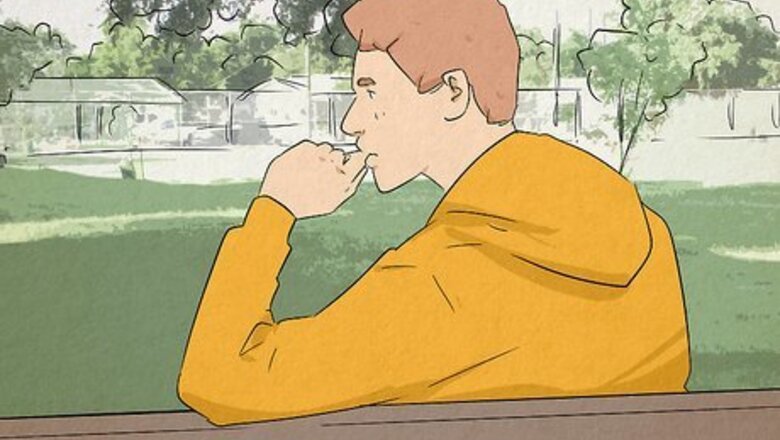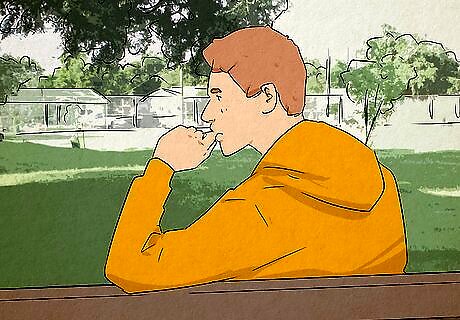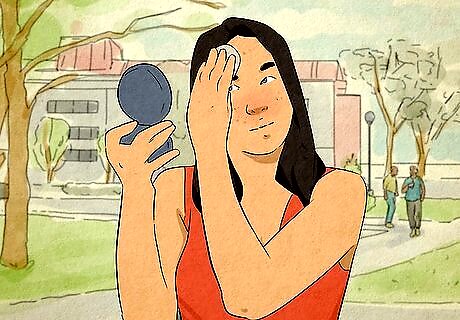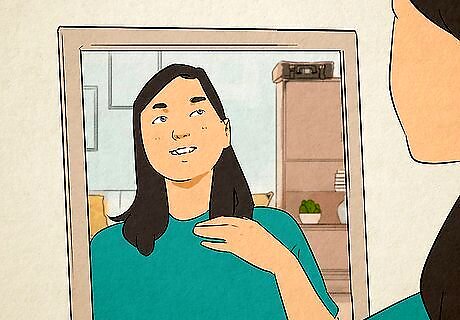
views
What is the “school air” theory?

“School air” is the theory that the air at school makes you look worse. The idea originated on TikTok in 2022, with users posting videos about how they felt confident in how they looked at home, but once they arrived at school, they felt much less attractive. TikTokkers then theorized that there’s something in “school air” causing flaws in their appearances, such as frizzy hair, dull or greasy skin, breakouts, cakey makeup, or dark circles. For example, this TikTok by @carlazombek shows the user feeling confident in her appearance before school, then flashes to a video of herself feeling less confident after school, with the words “It’s the school air” on the screen. This TikTok by @marksmaxed puts the theory into words super clearly: “I can walk into school looking perfectly normal, and then after school, I’ll check a mirror, and my hair is fried, I developed two new pimples, and then there’s a bunch of bags underneath my eyes. And I only have this problem when I go to school and then come home,” he says. The “boyfriend air” theory is closely related to the “school air” theory, and it originated around the same time. It suggests that being around one’s boyfriend causes the same negative effects on appearance as “school air” does. Meet the wikiHow Experts Alicia D’Angelo is a makeup artist who works for teams with Dior Makeup, YSL Beauty, and Pat McGrath Labs, as well as bridal companies Once Upon A Bride and Miss Harlequinn. Paul Friedman, MD, is a board-certified dermatologist with over 25 years of experience. He’s the director and founder of Dermatology & Laser Surgery Center in Houston, Texas. Adam Dorsay, PsyD is a licensed psychologist specializing in relationship issues, stress reduction, anxiety, and attaining more happiness in life.
Is “school air” real?
There does seem to be some truth to the “school air theory.” The air at school doesn’t have any magical powers, and it can’t actually change your appearance for the worse in any permanent way. However, it is possible that the environment at school can make you feel less confident in the way you look, and certain factors may have a negative effect on things like your makeup, hairstyle, or breakouts. We’ll go over some of the possible reasons behind this phenomenon below.
Causes of the “School Air” Phenomenon

Air quality Unfortunately, many school buildings in the U.S. have been reported to have problems with indoor air quality (IAQ). This means that they may have higher levels of pollutants, allergens, carbon monoxide, mold, or humidity. There haven’t been studies on how this could affect appearance, but poor air quality is known to cause issues for people who have allergies. And, if you’re spending all day sneezing, blowing your nose, and itching your eyes, you could easily be rubbing off your makeup or accidentally causing redness or irritation on your skin. Beyond this, high humidity levels could also affect the way you look. If the air in your school is extra humid, it could make you sweat more, leading to greasier skin and hair, and it can also cause frizz.
Lighting Schools tend to have fluorescent ceiling lights, rather than the more ambient lighting you might have from lamps at home. This type of fluorescent overhead lighting is known to be pretty harsh, accentuating all the shadows in a person’s face, and highlighting every tiny flaw you might be able to pick out. As a result, you might think you look worse when you look in the mirror at school, even though you felt good about how you looked while you were getting ready at home.
Busy schedules A typical school day is usually packed full of classes and extracurriculars. You’re lugging a heavy backpack around, rushing through hallways from class to class, and you may even have a P.E. class, a dance rehearsal, or a sports team practice. Throughout the day, these activities can cause you to sweat, which can easily melt off your makeup or make your hair appear greasy. Sweat can also lead to breakouts, which may explain the new pimple or two you might find at the end of the school day. All this running around can cause your hair to appear messier or more unkempt, too.
Stress School can be a super stressful environment! You’re worried about getting good grades and doing well in your extra curriculars, while also navigating your social life. All of this can lead to higher levels of the stress hormone cortisol, which gets released when you’re feeling anxious. Your skin has receptors that react to this stress hormone, causing more oil and sebum production. This in turn makes your skin look more greasy, and it can even lead to a breakout or two. If you have skin conditions like psoriasis, eczema, or rosacea, higher stress levels can also cause flares.
Tiredness Depending on your specific school schedule, you probably have to get up pretty darn early to get there on time, and you may also have stayed up late studying or finishing your homework. This could lead to tired-looking eyes, dark circles, and a groggy appearance overall. Beyond this, a lack of sleep is also linked to hormonal acne, which could explain those breakouts on school days.
Comparing yourself to others Finally, the “school air” phenomenon could have a psychological component. When you’re at school, you’re surrounded by a bunch of other people, which gives you the chance to compare yourself and pick out your flaws in a way that you might not do at home. This could lead to the perception that you look worse at school than you do in other settings.
How to Prevent the Effects of School Air

Use oil-controlling primer and mattifying setting spray with your makeup. As we’ve gone over above, being at school can cause oilier skin. And, “Sometimes, [cakey makeup] can happen from your oils pushing through and separating your makeup,” explains makeup artist Alicia D’Angelo. To prevent this, she recommends using an oil-controlling primer underneath your foundation to lock everything in. She also recommends finishing with a mattifying setting spray to control oil and lock your look in for the whole day. Once you’re already at school, D’Angelo recommends using powder to touch up. “Powder compacts can be a great way to touch up the foundation after you’ve been sweating and had your makeup shift. Pressed translucent powder will eliminate the oil without adding texture or coverage,” she says. Blotting papers can also come in handy in a pinch. These products are meant to soak up excess oil when you press them gently to the shinier areas on your face, like T-zone.
Use hairspray to lock in your hairstyles, and keep dry shampoo on hand. If you’ve noticed that your hair looks messy or frizzy at school, a quick spritz of hairspray before you leave in the morning could do the trick to prevent flyaways and keep your hairstyle in place. If your issue is greasy hair at school, dry shampoo is your best friend. It’s made to quickly soak up oils and give your hair a quick volume boost, making it look clean and freshly washed, even if you’ve been sweating. Dry shampoo is especially helpful if you have gym class, dance rehearsal, or a sports practice during your school day!
Take care of your skin with a solid skincare routine. A good skincare routine helps you keep your skin clear and healthy in general, which means it’s a great way to fight against the negative effects of school air. The right skincare routine can vary from person to person, but here’s a simple routine to follow if you’re just getting started with skincare: Wash your skin each morning and night with a gentle facial cleanser. Apply a gentle, noncomedogenic facial moisturizer after washing your face to keep your skin hydrated. Finish your morning routine with sunscreen to protect your skin from UV rays. If you’re dealing with breakouts, consider trying over-the-counter products, such as benzoyl peroxide or salicylic acid, to control them. If you have frequent breakouts or more severe acne, over-the-counter products might not do the trick. In this case, schedule an appointment with a dermatologist. They’ll be able to recommend treatments to help get the acne under control!
Make sure you’re getting enough sleep every night. “Getting eight hours of sleep is very important for your skin,” says board-certified dermatologist Paul Friedman, MD. If you need to stay up a little late one night to study or work on an assignment, that can’t always be helped, but you should try your best to avoid staying up too late for other reasons. In other words, avoid scrolling endlessly on TikTok or binge-watching your favorite show on Netflix until 3:00 a.m. when you have to be up for school at 6:30. Turn out the lights and get some quality sleep—your skin will thank you for it!
Practice deep breathing to control stress levels. Dr. Friedman adds that reducing stress is equally essential for your skin, and as we’ve gone over, school can be a pretty stressful environment. When you feel those cortisol levels rising throughout the day, try to pause and do a deep breathing exercise. Here’s how: “The first thing we want to do is slow down our heart rate, if at all possible,” explains licensed psychologist Adam Dorsay, PsyD. He recommends inhaling for four counts, holding that breath for four counts, exhaling for four counts, waiting four counts again after exhaling, then repeating.

Repeat positive affirmations to boost your confidence. If you think your issues with your appearance at school have to do with comparing yourself to others, positive affirmations can really help. These types of statements boost your self-esteem overall, which can help you carry yourself with more confidence. And everyone knows confidence is always attractive! “An easy way to feel more confident is to write a list of at least 10 things that are amazing about you,” explains love and relationship coach Nicole Moore. “Dig deep, and think about what’s great about your personality, how you treat people, and what your unique talents and skills are.” Once you’ve come up with a few things you love about yourself, like “I’m a loyal friend,” or “I’m a hard-working person,” repeat these statements to yourself a few times a day to boost your self-esteem. Moore also recommends trying mirror work. “Actively practice looking in the mirror and finding things to appreciate, instead of things to criticize. If you do this over time, you’ll start to build a practice of appreciating how you look, rather than criticizing it. Your confidence will build because you’re focusing on what’s great about you, and you’re ignoring the critical voice that likes to point out your flaws.”

















Comments
0 comment